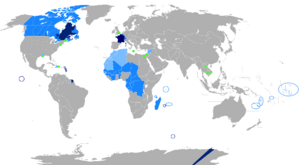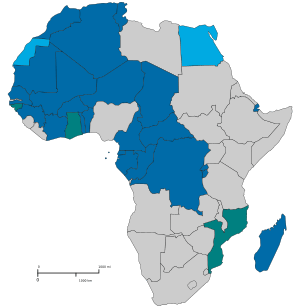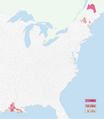French language facts for kids
Quick facts for kids French |
||||
|---|---|---|---|---|
| français | ||||
| Native to | France | |||
| Region | Francophonie (French-speaking world) (geographical distribution below) |
|||
| Native speakers | 300 million speakers (2019) An estimated 300 million French speakers (L1 plus L2; 2019) |
|||
| Language family | ||||
| Early forms: |
Old French
|
|||
| Dialects |
Tourangeau
|
|||
| Writing system | Latin (French alphabet) French Braille |
|||
| Official status | ||||
| Official language in |
Numerous international organisations |
|||
| Regulated by | Académie française (French Academy) (France) Office québécois de la langue française (Quebec Board of the French Language) (Quebec) |
|||
| Linguasphere | 51-AAA-i | |||

Regions where French is the main language
Regions where it is an official language Regions where it is a second language Regions where it is a minority language |
||||
|
||||
French (in French, français, pronounced "Fronce-eh") is a beautiful language that first started in France. It's part of a group called Romance languages, which all came from Latin. Today, French is spoken in many places around the world.
You'll hear French in Belgium (especially in a region called Wallonia), Luxembourg, and Switzerland. In Canada, it's a main language in Quebec. French is also spoken in many countries across Africa, a region often called Francophone Africa. About 300 million people speak French, either as their first language or as a second language they learned. French has even influenced other languages, like Haitian Creole.
Like other Romance languages, French words have genders. This means that nouns (words for people, places, or things) are either masculine (masculin) or feminine (féminin).
Contents
The History of French
Long, long ago, a group of people called the Celts lived in the area we now call France. Back then, this land was known as Gaul. The powerful Romans conquered Gaul and divided it into different parts.
Because the Romans spoke Latin, the local people started learning and speaking Latin too. Their original language, Gaulish, was spoken less and less. However, a language called Breton, which comes from the old Celtic language, is still spoken today in a part of France called Brittany.
After the Roman Empire fell, many Germanic peoples moved into the countryside. The Latin spoken by everyday people, called Vulgar Latin, began to change very quickly. In medieval France, this changing Latin turned into two main ways of speaking, or dialects: langue d'oc and langue d'oïl.
Both names mean "language of yes." This is because oc was the word for "yes" in the southern part of France, and oïl meant "yes" in the northern part. Today, the word for "yes" in French is oui, which sounds like "we".
In 1635, France created the Académie française, also known as the French Academy. Its job was to make the French language standard, meaning everyone would follow the same rules. Even today, this academy sets the rules for what is considered Standard French.
The langue d'oc is now called Occitan. Many people in Southern France still speak it.
French Letters and Sounds
French uses the Latin alphabet, just like English. But there are a few special differences, especially with vowels. French vowels can have small marks called diacritics added to them.
These marks include the acute accent (like in é), the grave accent (like in è), and the circumflex accent (like in î). Also, a cedilla can be added to the letter c to make ç.
Vowels
- a sounds like the "ah" in "father".
- ai and ei sound like the "ay" in "say".
- an and en often have a special nasal sound, like the "on" in "wrong". This changes if there are two n letters or an e right after them.
- au and eau sound like the "o" in "note".
- When words end with er or ez, the e sounds like the "ay" in "say".
- Otherwise, e often sounds like the "a" in "about". If it's at the end of a word, it's usually silent, unless the word is very short.
- é sounds like the "ay" in "say".
- è and ê sound like the "e" in "bed".
- For other vowels, the three diacritics don't usually change their sound much.
- i and y sound like the "ee" in "tree".
- in often has a nasal sound, like the "an" in "bank". This changes if there are two n letters or an e right after it.
- o sounds like the "o" in "note".
- oi sounds like a "w" followed by the "ah" in "father".
- oin sounds like the "wan" in "twang".
- on often has a nasal sound, like the "on" in "long". This changes if there are two n letters or an e right after it.
- ou sounds like the "oo" in "food".
- œ sounds like the "e" in "verse", but with your lips more rounded.
- u is a unique sound. Try saying "ee" as in "feed," but round your lips as if you were saying "food."
- un often has a nasal sound, like the "un" in "hung". This changes if there are two n letters or an e right after it.
Consonants
- Like in English, c sounds like a "k" before most letters. But it sounds like a soft "s" before e, i, or y.
- ç always sounds like a soft "s".
- ch, sh, and sch sound like the "sh" in "shop".
- g sounds like a hard "g" before most letters. Before e, i, or y, it sounds like the "s" in "treasure".
- gn sounds like the "ny" in "canyon".
- h is always silent in French.
- j sounds like the "s" in "treasure".
- l usually sounds like the "y" in "yes" if it comes after the letter i. Otherwise, it sounds like an "l".
- m and n can change their sound if they come after a vowel (see the vowel section above).
- qu sounds like a "k".
- r is different from English. It's a soft, gargling sound made at the back of your throat.
- th sounds like a "t", not like the "th" in English.
- x can sound like "gz" or "ks".
- b, d, f, k, p, ph, s, t, v, w, and z sound similar to how they do in English.
If a French word ends with a consonant, that consonant is usually not pronounced. However, there are exceptions! If the word is very short, or if the last consonant is a c, r, l, or f, then it is usually pronounced.
Common French Words and Phrases
Here are some examples of French words and sentences you might hear:
| Word | Meaning |
| Oui | Yes (si when used as a reply to non or negative expressions) |
| Non | No |
| Bonjour | Hello (formal) |
| Au revoir | Goodbye |
| Salut | Hi and goodbye (informal) |
| Merci | Thank you |
| Merci beaucoup | Thank you very much |
| Monsieur | Sir, mister |
| Madame | Madam, Mrs. |
| Homme | Man |
| Femme | Woman |
| Fille | Girl |
| Garçon | Boy |
| Poulet | Chicken |
| Formidable | Wonderful |
| En vacances | On vacation/holiday |
| Eau | Water |
| Manger | To eat |
| Parlez-vous français? | Do you speak French? |
| Je parle français. | I speak French. |
| Comment allez-vous? | How are you? (formal or more than one person) |
| Comment vas-tu? | How are you? (informal) |
| Je t'aime. | I love you. |
| Où sont les toilettes s'il vous plaît ? | Where are the toilets, please? |
| Comment t'appelles-tu? | What is your name? |
| Je m'appelle... (your name) | My Name is... (your name) |
| Je parle l'anglais | I speak English |
| S'il vous plaît | Please (Formal) |
| J'ai besoin d'un taxi | I need a taxi |
You might notice that many French words look and sound like English words. This is because English borrowed many words from the Norman language. Norman was a type of French spoken by the Normans who conquered England long ago.
Even though English is considered a Germanic language (like German), it has many words from French. Words in different languages that have the same meaning and are spelled similarly are called cognates. For example, most English words ending with "tion" and "sion" originally came from French.
Here are more examples of cognates:
| Word | Meaning |
| Non | No |
| Théâtre | Theatre |
| Crème | Cream |
| Ballon | Balloon |
| Difficile | Difficult |
| Dragon | Dragon |
| Rat | Rat |
| Cinéma | Cinema |
| Énergie | Energy |
| Ennemi | Enemy |
| Oncle | Uncle |
Related Pages
Images for kids
-
A town sign in Standard Arabic and French at the entrance of Rechmaya in Lebanon.
-
A 500-CFP franc banknote, which is worth about €4.20 or US$5.00. This money is used in places like French Polynesia, New Caledonia, and Wallis and Futuna.
See also
 In Spanish: Idioma francés para niños
In Spanish: Idioma francés para niños
 | Dorothy Vaughan |
 | Charles Henry Turner |
 | Hildrus Poindexter |
 | Henry Cecil McBay |







